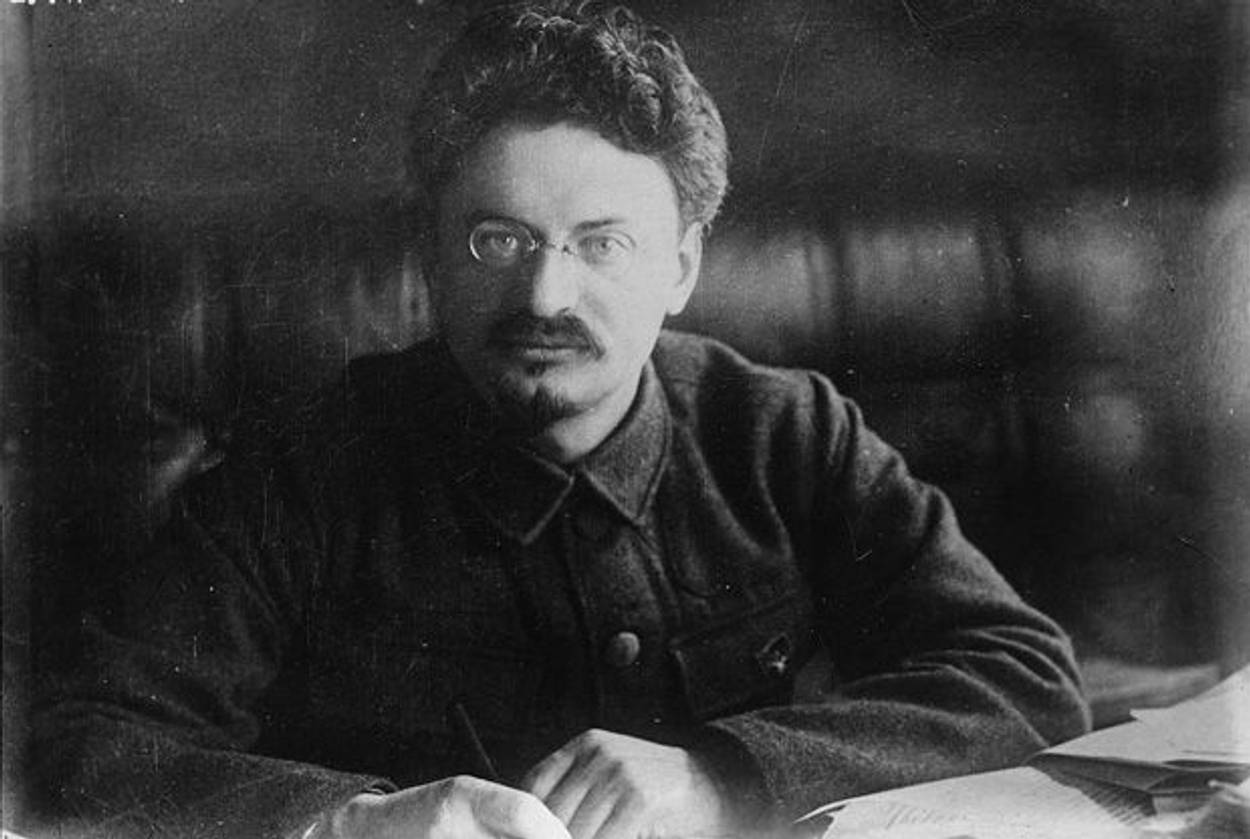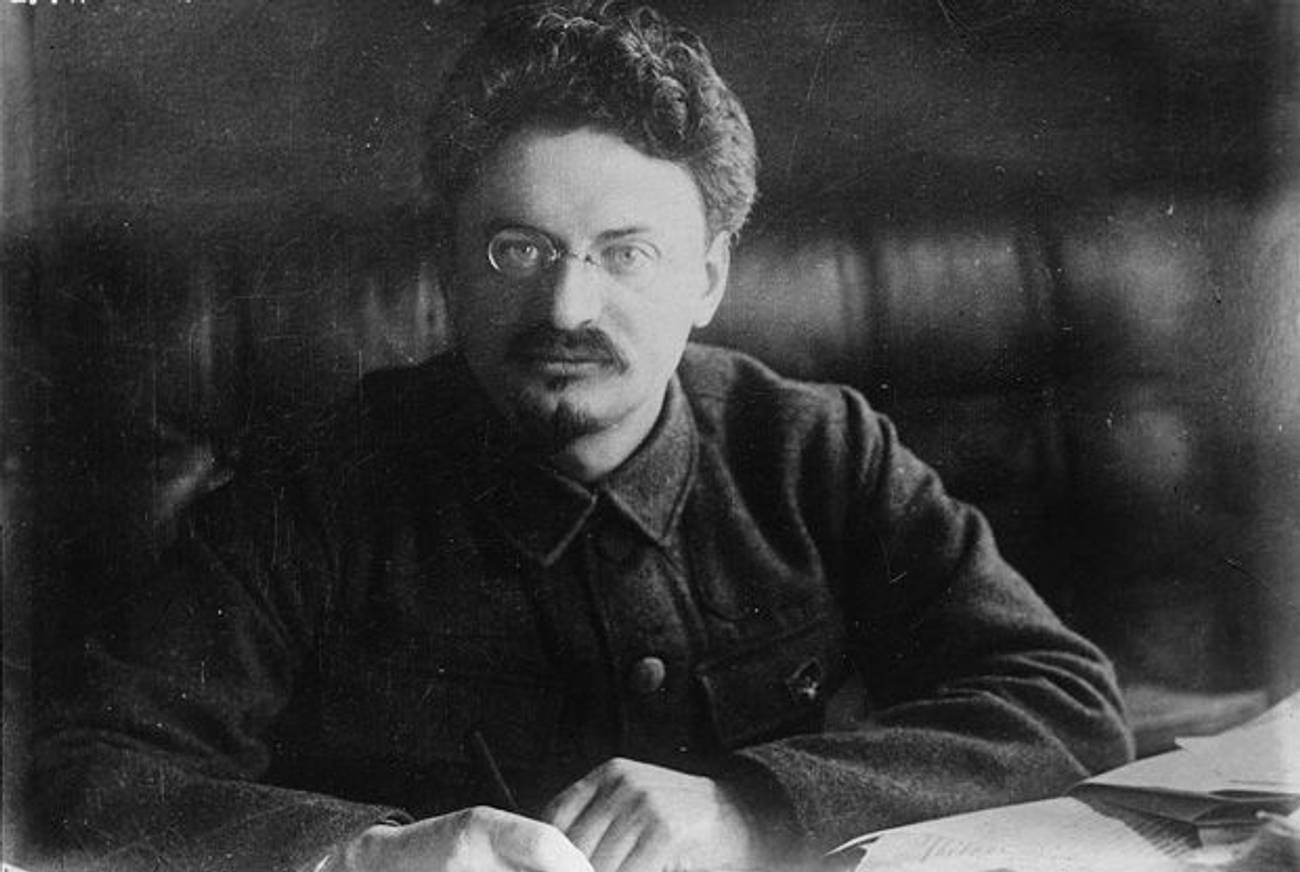Trotsky the Jew
Joshua Rubenstein’s new biography obscures the Russian revolutionary’s violent extremism while overemphasizing his Jewishness




According to Amazon.com, there are presently in existence 199 biographies of Leon Trotsky—almost a quarter as many as there are of Marilyn Monroe (810). Joshua Rubenstein’s new work, Leon Trotsky: A Revolutionary’s Life, is a specialized one issued by a Yale series called “Jewish Lives,” which is “designed to illuminate the imprint of eminent Jewish figures” on culture, broadly defined. There is no question that genetically speaking, Trotsky was a Jew. But personally and culturally, he emphatically denied any connection with the Jewish people. Quoting from my book Russia Under the Bolshevik Regime:
Trotsky—the satanic “Bronstein of Russian anti-Semites”—was deeply offended whenever anyone presumed to call him a Jew. When a visiting Jewish delegation appealed to him to help fellow Jews, he flew into a rage: “I am not a Jew but an internationalist.” He reacted similarly when requested by Rabbi Eisenstadt of Petrograd to allow special flour for Passover matzos, adding on this occasion that “he wanted to know no Jews.” At another time he said that the Jews interested him no more than the Bulgarians. According to one of his biographers [Baruch Knei-Paz], after 1917 Trotsky “shied away from Jewish matters” and “made light of the whole Jewish question.”
So, it is questionable whether Trotsky can be properly treated as an “eminent Jewish figure.” He certainly would have resented it. He had no idea what caused anti-Semitism, claiming it to be “one of the more malignant convulsions of capitalism’s death agony,” as if it had not existed in the Middle Ages, long before capitalism was born.
He was a renegade. This did not help him to make a successful career in the party. He was resented as a Jew as well as someone who during the decade preceding the Bolshevik power seizure relentlessly criticized Lenin and his followers. His prickly personality also was of no help, contrasting with Stalin’s joviality during the years the two struggled for power.
The situation for Jews in pre-1917 Russia, which shaped Trotsky’s personal and political trajectory, was very difficult. Except for rich merchants and those with a university degree, they were confined to the so-called Pale of Settlement. They were excluded from government posts and altogether treated as second-rate subjects. On occasion, they were victims of vicious pogroms in the course of which they were beaten and killed and their homes looted. This caused many of them to emigrate and the rest to turn to left-wing ideologies. The prevalent opinion was that the Bolsheviks were heavily supported by Jews, but the results of the only free elections held under Bolshevik rule, those to the Constituent Assembly in November 1917, revealed that the Bolshevik vote came not from the Pale of Settlement but mainly from the armed forces and the cities of Great Russia, where hardly any Jews lived. The census of the Communist Party conducted in 1922 showed that only 959 Jews had joined it before 1917. If subsequently the proportion of Jews in the Communist Party exceeded their proportion in the country’s population, so too was that the case in Italy under Fascism. It simply attests to the fact that the Jews are a very articulate and politically engaged people.
Rubenstein, the author of a life of the Soviet writer and journalist Ilya Ehrenburg, has written a competent summary biography of his protagonist. The book adds little that is new to the existing literature, and it has some strange omissions. Trotsky’s role in the Civil War during which he commanded the Red Army—arguably his main contribution to the Bolshevik cause—is disposed of in a few cursory pages. I also found strange the author’s offhand assertion that under the Bolsheviks “the proletariat had succeeded in gaining control of the government.” Where and when? The workers had next to no influence on the policies of the Soviet government, which were managed by intellectuals.
In view of the murderous paranoia of Stalin, it is tempting to gloss over Trotsky’s own ruthlessness and to depict him as a humane counterpart to his rival. This is quite unwarranted. Without a question, Trotsky was better-educated than Stalin and was altogether a more cultivated human being. But his radicalism was not much different than Stalin’s. Rubenstein cites a statement by Trotsky as the motto of his book: “Nothing great has been accomplished in history without fanaticism.” Really? In art, in science, in economics? In fact, fanaticism, which is uncritical belief in something, has always obstructed true accomplishment.
Let us scrutinize briefly Trotsky’s views on such key issues as forced labor, terror, and concentration camps—the outstanding features of the Stalinist regime. On forced labor, Trotsky had this to say in 1921:
It is said that compulsory labor is unproductive. This means that the whole socialist economy is doomed to be scrapped, because there is no other way of attaining socialism except through the command allocation of the entire labor force by the economic center, the allocation of that force in accord with the needs of a nation-wide economic plan.
I imagine that if Stalin was present at the Third All-Russian Congress of Trade Unions, at which Trotsky made these remarks, he must have nodded in agreement. In view of Trotsky’s own sentiments, it is likely that if he had succeeded Lenin, we would have witnessed in the Soviet Union much the same oppression of labor as he did under Stalin.
Trotsky had no qualms about introducing into Soviet Russia political terror. Barely two months after the Bolsheviks had seized power, he said:
There is nothing immoral in the proletariat finishing off the dying class. This is its right. You are indignant … at the petty terror which we direct at our class opponents. But be put on notice that in one month at most this terror will assume more frightful forms, on the model of the great revolutionaries of France. Our enemies will face not prison but the guillotine.
He defined the guillotine (plagiarizing the French revolutionary Jacques Hébert) as a device that “shortens a man by the length of a head.” This grisly remark, incidentally, is cited by Rubenstein.
Trotsky demonstrated that this was not empty rhetoric during the rebellion at the Kronshtadt naval base in February 1921. The sailors of Kronshtadt were early and prominent supporters of the Bolsheviks, helping them in October 1917 to seize power in Petrograd and later to defend that city from the Whites. But the sailors gradually became disenchanted with the new regime. In March 1921 they formed a Provisional Revolutionary Committee and refused to obey Moscow’s orders. Upon arriving in Petrograd, Trotsky demanded that the mutineers throw themselves on the mercy of the Soviet government and ordered that the families of the mutineers be taken hostage; one of the regime’s appeals to the rebels threatened that if they continued to resist they would “be shot like partridges.” Trotsky organized the military assault on the island where the base was located: When some of the Red Army soldiers defected to the rebels, he ordered the execution of every fifth soldier who disobeyed orders. The island eventually fell. Trotsky was not proud of his role in this event, as demonstrated by the fact that in his memoirs he hardly mentioned it.
Though the fact is little-known, it was Trotsky, not Stalin, who introduced into Soviet Russia the concentration camp, an institution that under Stalin developed into the monstrous Gulag empire. Trotsky did this in May 1918 in connection with a rebellion of Czech ex-prisoners of war who, en route to the Far East to sail to the western front, rebelled when an attempt was made to disarm them. In August of that year, to protect the railroad line running from Moscow to Kazan, Trotsky ordered a network of concentration camps to be constructed to isolate “sinister agitators, counterrevolutionary officers, saboteurs, parasites, and speculators” who were not executed or subjected to other penalties. Lenin fully agreed with these measures. By 1919, concentration camps were established in every provincial capital. In 1923, Russia had 315 concentration camps with 70,000 inmates.
These facts will not be found in Rubenstein’s book, which, without being an apologia, nevertheless tends to glide over the more savage features of Trotsky’s thought and behavior. My own judgment of Trotsky coincides with that of George Orwell, made in 1939 when Trotsky was still alive and cited in this book:
[Trotsky] is probably as much responsible for [the Russian dictatorship] as any man now living, and there is no certainty that as dictator he would be preferable to Stalin, though undoubtedly he has a much more interesting mind. The essential act is the rejection of democracy—that is of the underlying values of democracy; once you have decided upon that, Stalin—or any rate someone like Stalin—is already on the way.
Richard Pipes is emeritus professor of history at Harvard University and the author of 22 books.
Richard Pipes is emeritus professor of history at Harvard University and the author of 22 books.